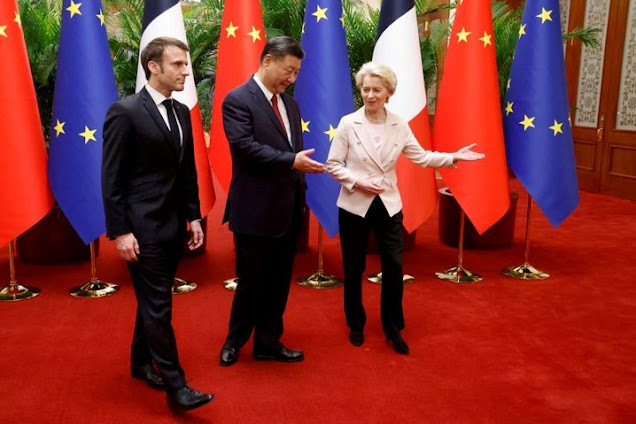"De-Risking"
How Europe Can Best Stand Up To China
Europe has a plan for dealing with China without betraying our interests. Unfortunately, the leaders of Germany, France and other countries have so far failed to adopt it.
A DER SPIEGEL Editorial By Georg Fahrion in Beijing
 French President Emmanuel Macron in Beijing with Chinese President Xi Jinping Foto: Thibault Camus / AFP
French President Emmanuel Macron in Beijing with Chinese President Xi Jinping Foto: Thibault Camus / AFPThere it is, finally: a strategic blueprint on how Europe should deal with authoritarian China.
And what does one of the most powerful men on the Continent do with it?
He torpedoes it, at least for now.
Officials in Beijing courted French President Emmanuel Macron last week, and he returned the favor with remarks that delighted his authoritarian hosts.
On his return flight to Paris, he warned that Europe cannot allow itself to degenerate into a vassal of the United States.
A possible escalation of the Taiwan conflict, he said, is "not ours," sending a devastating message.
His China trip turned into a debacle.
But Macron had been accompanied to Beijing by a woman who at least knows how things could have been handled.
European Commission President Ursula von der Leyen recently gave a remarkable speech in which she sketched the outlines of a modern China policy more clearly than any leading European politician has done before her.
Whereas Germany has for too long believed the China would transform itself into a liberal state through trade, von der Leyen recognizes the country is "becoming more repressive at home and more assertive abroad."
She sees how relentlessly China is in its desire to make the world increasingly dependent on it.
And she is right to say that state and party leader Xi Jinping wants to transform the international system with the goal of placing China at its center.
Wisely, von der Leyen’s conclusion is not that Europe should adopt the American concept of "decoupling."
An economic decoupling would neither be desirable nor feasible, at least not with a daily trade volume of almost 1 billion euros and thousands of European companies operating their own subsidiaries and factories in China.
Not every screw or kitchen appliance traded with China immediately endangers Europe’s interests.
Rather than "decoupling," von der Leyen is calling for "de-risking," the reduction of risks arising from dependencies.
It’s a clever device that allows Europe to keep open its dialogue with China.
And, of course, the cultural, scientific and political exchange must also continue.
In sensitive areas like quantum computing, artificial intelligence and biotechnology, the EU should not cooperate with China.
Europe should impose higher barriers in areas where China violates free competition or there are sensitive security issues.
Companies that are provided with unfair subsidies must be barred from doing certain business in the EU.
In sensitive areas like quantum computing, artificial intelligence and biotechnology, the EU should not cooperate with China.
The European Commission president is also right to question the previously negotiated investment agreement.
Rather than deeper ties with China, what is needed is closer cooperation with other countries similar to the EU member states.
This is the only way that Europe’s economy can open itself up to new sources of raw materials and markets.
So, if the EU wants to gain "strategic autonomy" vis-à-vis China, as Macron is calling for, then he should simply take his cue from von der Leyen.
Leaders in other European capitals could be bolder when it comes to going up against Xi Jinping. But their fear of being punished by Beijing runs too deep.
China is very skillful at playing to the appetites of individual prime ministers and presidents.
They are too tempted to create advantages for their own industry.
Corporate bosses’ influence on governments is also too considerable.
Volkswagen, BMW, Daimler and BASF, in particular, have exposed themselves to the Chinese market to a frightening extent and are unlikely to be able to do much extract themselves.
Allowing China to access critical infrastructure in Germany is the complete opposite of a "de-risking" strategy.
For Europe to adopt a strong position vis-à-vis Beijing, it needs to act in a united and disciplined manner.
But Macron’s trip to China demonstrates once again that this is precisely what is lacking.
From the Germans, too.
During his inaugural visit to Beijing in November, German Chancellor Olaf Scholz managed to find clear words on Taiwan and the human rights violations in Xinjiang.
Yet he still considers the plan by the Chinese shipping company Cosco to acquire part of the Port of Hamburg to be perfectly acceptable.
Allowing China to access critical infrastructure in Germany is the complete opposite of a "de-risking" strategy.
German Foreign Minister Annalena Baerbock, who arrived in China on Thursday, is taking a harder line, but she has proven unable to prevail against Scholz.
The disunity within the German government is another reason why a smart European China policy is failing.
The EU cannot afford to be wayward on this issue.
Because one thing should be clear to everyone: The strong man on the other side, Xi Jinping, knows exactly what he wants.

0 comments:
Publicar un comentario